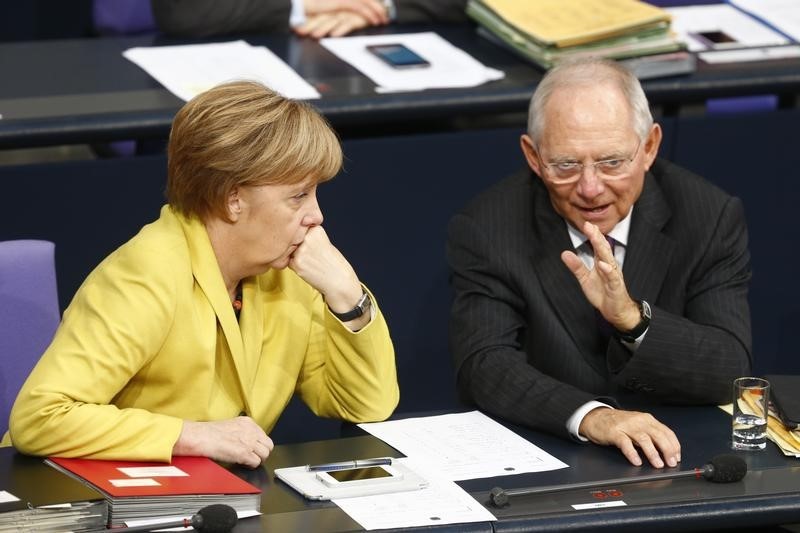By Matthias Sobolewski and Stephen Brown
BERLIN (Reuters) - German Chancellor Angela Merkel narrowly averted a far bigger rebellion last month on Greece's bailout extension among her conservatives, many more of whom would have voted 'Nein' but for her finance minister's powers of persuasion, lawmakers said.
Germany's parliament voted on Feb. 27 to extend Greece's bailout by four months, but a record number of conservative dissenters were not convinced that Athens would deliver the economic reforms it has promised.
One senior conservative told Reuters that Merkel's Bavarian allies, the Christian Social Union (CSU), "would have unanimously voted 'No'" had Wolfgang Schaeuble not solicited support during a personal appearance two days before the vote.
Another leading conservative said Schaeuble's meeting with Merkel's Christian Democrats (CDU) was equally important in securing their support at a time when confidence in the Greek government was "kaputt" in the lower house of parliament.
"The vote was hanging by a thread," the lawmaker said, on condition of anonymity.
Schaeuble is a leading advocate of the austerity measures that Greece's new left-wing government wants to scrap.
The lawmakers' comments point to a growing groundswell of discontent within conservative ranks and suggests there is a risk they would not be prepared to approve a third bailout for Greece if Athens asks for more help in future from its partners.
"The Greeks say 'We don't need a third bailout' - but they also said they wouldn't need this bailout extension," said the conservative lawmaker.
In the last vote, 29 of the 32 parliamentarians who voted against an extension for Greece came from Merkel's CDU and the CSU. In addition, 118 conservatives who voted "yes" gave personal statements signalling they would not keep toeing the party's current line unless there was a significant change.
GERMAN OUTRAGE
Germans have been outraged by Athens' anti-German rhetoric, including comments from Prime Minister Alexis Tsipras vowing to seek war reparations from Berlin on the grounds that German troops occupied Greece during World War Two.
For all their dissatisfaction with Greece, however, German conservative lawmakers do tend to fall in line in the end and the popularity of Merkel in her party as well as that of CSU leader Horst Seehofer would be likely to help, analysts say.

In addition, Merkel's Social Democrat junior coalition partners and the opposition Greens voted unanimously in favour of the extension in February, suggesting they can be counted on in future for measures which offer solidarity with Greece.